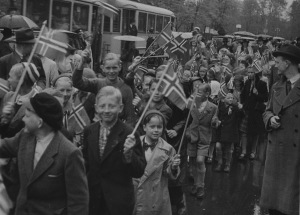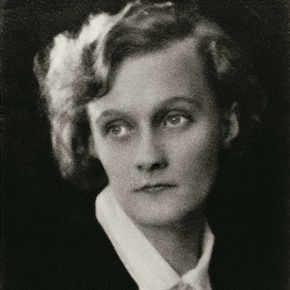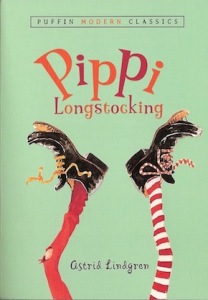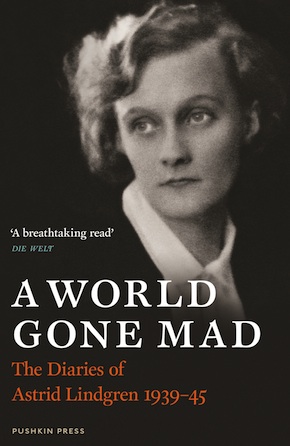Waves of joy and doubt
by Astrid LindgrenDuring the Second World War Astrid Lindgren, creator of Pippi Longstocking, was an aspiring writer living in Stockholm with her family, working in a top secret job at the Swedish Mail Censorship Office. Horrified and fascinated as world events unfolded, she kept a meticulous diary full of newspaper clippings (and occasional snippets from the letters she read in her work) as she tried to make sense of man’s capacity for inhumanity. Here are some of her entries as the war dragged to a close.
23 March, 1945
In Finland, things have been coming to a head of late. At the start of March their minister of labour Wuori gave a remarkable radio address, basically saying that all traces of Nazism would have to be eradicated from Finland or the country would suffer for it. The parliamentary elections, wider in scope than any before, ended in victory for the ‘democrats’, that is, the Communists, who have been banned in Finland since 1930 but now have the wind in their sails.
Germany is being completely wiped out. There soon won’t be a German soldier west of the Rhine. There was an upsetting description in Stockholms-Tidningen the other day about the state of things in Germany – I haven’t got it, unfortunately. Hitler doesn’t want to surrender; he’s worried history will deliver a shameful verdict, that was one thing the article said.
The Shell Building, the German headquarters in Copenhagen, was levelled to the ground by Allied bombers. A Catholic school caught fire and lots of children were killed.
Norway has seen many executions by firing squad.
25 April
Berlin is a smoking heap of rubble, and according to the evening news a little while ago completely surrounded by the Russians.
It takes me several hours to cut everything out of the papers. The evening papers excel in gruesome descriptions of the concentration camps in Germany. I don’t want to put them all in.
To me it feels as if there’s a smell of fresh blood emanating from Germany, and a terrible sense of doom. It feels like Untergang des Abendlandes [the fall of the West].
German women have been taken to see the horrors of Buchenwald – as have a number of neutral press reporters.
I’ve read lots of letters from Danish Jews, whom the Red Cross brought back from Theresienstadt. They are now very happily housed in a camp near Strängnäs. The Red Cross also brought Swedish and Norwegian students home, but that’s all top-secret for the time being.
The Jews’ letters were deeply moving. Even though Theresienstadt was a comparatively decent place and the Danes had special status.
The San Francisco conference started today (without any Roosevelt). Just imagine all the half-baked theories they’ll put forward!
Germany surrenders – finally! Why not earlier, before the whole of Germany was reduced to a pile of rubble and so many children were sent to their deaths?
29 April
This Sunday morning, when we were woken by the sound of the rain gushing in the gutters, the huge headline in the paper read:
THE GERMANS SURRENDER!
Germany surrenders – finally! Why not earlier, before the whole of Germany was reduced to a pile of rubble and so many children aged 10–12 were sent to their deaths?
We heard it first on last night’s news. Sture and I were sitting there, having our usual little Saturday powwow, but there have been so many rumours going round lately that one hesitates to believe anything in a hurry.
Himmler, that monster, proposed the peace and claims Hitler’s dying and won’t survive the surrender by more than 48 hours.
The whole thing’s been mediated by a Swede – Count Folke Bernadotte, head of the Swedish Red Cross. Unconditional surrender – no wonder Hitler’s dying. Perhaps he’s been dead for ages, perhaps Himmler had him killed. Just think, the war’s coming to an end, it’s unimaginable! Germany lost it after Stalingrad, really – why did the pointless fight have to go on for so many years?
In parliament the other day there was a secret plenary to take a decision on possible armed intervention in Norway. They voted almost unanimously against. Quite right, why should we enter the fray at the eleventh hour? Luckily the question is now immaterial, because both Norway and Denmark will very probably be given up without a fight – Allied condition. And I can’t believe the Germans in Norway are so crazy that they’ll keep up the fight on their own.
But all the youngsters, the Norwegian refugees, and Danes too, who are here in our country preparing to go back home and do their bit in the final struggle, might be disappointed. The Norwegian government in London is (or was) disappointed in us for not wanting to get involved.

Norwegian refugees in Sweden celebrating Constitution Day, 17 May 1945. National Archives of Norway/Wikimedia Commons
It’s not the first time they’ve been disappointed in us for one thing or another, but I reckon we can take it with equanimity. Think how disappointed the British and French were when we wouldn’t join in the punch-up in Finland and let Allied troops through to fight Russia, which at that time was allied with Germany. What would the world look like now if we’d been swayed by their disappointment! Germany and Russia united, dear oh dear, then Britain would have been in a real fix. And how let down they felt when we, having very little choice, were obliged to let the German leave trains through to Norway, which certainly was a deplorable and painful episode, but the most sensible course of action in the long run. Because Sweden was needed outside the war. Looking back, we’ve achieved a fair bit, nothing to get all puffed up about of course, but gratifying all the same. We provided unprecedented material aid to Finland. And almost as much to Norway. We’ve been a place of refuge for nearing – what shall I say – 100,000 Norwegian and Danish refugees, perhaps that’s a slight overestimate, I’m not sure. We’ve run courses for them in special ‘police camps’ that provided little short of standard military training. And now, in these last days, we were able to arrange for the Danes and Norwegians interned in Germany, Jews and others, to be brought to Sweden. I’ve read some of the letters that these young people sent to their families at home once they got here, and they’re exultant. “Think that life can be so glorious” – “Are we dreaming?” and so on. It’s the joy of being able to sleep in a proper bed, eat proper food, walk in the forest to pick wood anemones and live a normal life, in spite of everything. One wrote that he had God to thank above all, and then the Swedish Red Cross. And now we have a Swede acting as intermediary to bring the peace offer from Germany. Somebody’s got to stay neutral, otherwise there can never be peace – for want of intermediaries.
Just think that there’s to be peace! It’ll be May in a few days’ time – it’s spring, the trees are turning green and the lovely rain is falling on the land that will now have to yield enormous harvests to keep the human race alive. There won’t be another wartime winter, thank God! I’m glad the war’s ending in spring, so that poor, tormented peoples have time to get ready, rebuild a bit and lay in some food, before winter comes again.
Spring 1945 – we never thought it would go on so long.
Evening
It was a lie! The surrender. But it’s going to happen in the next few days, at any rate. Somebody in America let the cat out of the bag. The part about Folke Bernadotte bringing a verbal message from Himmler was true. But I expect they are only willing to surrender to Britons and Americans, not to Russians. And Stalin doesn’t want to agree to any surrender until the German army has been completely crushed. There are so many rumours buzzing about that it’s hard to know what to believe. There are confident claims that Hitler died of a stroke at the start of the week, but it might not be true. According to today’s papers, Mussolini’s been shot.
Sture isn’t in for dinner this evening, but he sent home a bottle of sherry so we could celebrate the peace. They’re playing ‘The Star-Spangled Banner’ on the radio at the moment and I feel a bit giddy.”
7 May
It’s VE Day! The war’s over! The war’s over! THE WAR IS OVER!
At 2.41 p.m. (I think), the surrender was signed in a little red schoolhouse in Reims, for the Allies by Eisenhower (Bedell Smith), for the Germans by Jodl, under the terms of which all German forces in the whole of Europe capitulated. Norway’s free now, too. At this very moment, a wild sense of jubilation is spreading across Stockholm. Kungsgatan is ankle-deep in paper and everyone seems to have gone crazy. We sang ‘Ja, Vi Elsker’ [the Norwegian national anthem] at work after the radio broadcast at 3 o’clock. Sture isn’t in for dinner this evening, but he sent home a bottle of sherry so we could celebrate the peace. They’re playing ‘The Star-Spangled Banner’ on the radio at the moment. I’ve been drinking sherry with Linnéa and Lars and feel a bit giddy. It’s spring and the sun is shining on this blessed day and the war is over. I wouldn’t want to be German. Just think, the war’s over, Hitler’s dead (there’s shouting and cheering on the radio now; Stockholm has completely taken leave of its senses). “The waves of joy are still washing over Kungsgatan,” the announcer is saying, “It’s a gloriously wonderful day.”
I slipped Lasse an extra two kronor and he went dashing off to join the crowds all over the world. I gave Karin one krona and she celebrated the peace by buying sweets.
A Norwegian woman has just come on, and she’s talking about how she felt when peace arrived: she’s longing to see her son, who is in England.
Oh, oh, now it’s over, all the torture and concentration camps and bombing raids and Ausradierung [eradication] of cities, and perhaps battered humanity can have a little rest.
Germany and the Germans are hated – but one can’t hate all Germans, one can only pity them.
The war is over – it’s the only thing that matters at the moment.
The war is over! The official announcement will be made from Great Britain, America and Russia simultaneously.
Alli and I and Karin and Matte took a tram down into town to see with our own eyes what Stockholm looked like on this historic day and struggled our way along Kungsgatan through the excited crowds. Then we took the tram home – and I’ve just heard on the evening news how overjoyed they are in Norway. A crowd gathered outside Møllergata 19 [the Nazi headquarters in Oslo], that ill-famed address, and sang the national anthem to the prisoners, though some have already been released. King Gustaf addressed the Swedish people from Drottningholm Palace; he’s sent a telegram to Haakon. With the surrender came a severing of diplomatic ties with Germany. We saw three policemen outside the German tourist office in Kungsgatan as we walked past, and there was a cover over the window. After all the German arrogance proclaimed from there! And I’ve lost count of the number of times the windows were smashed during the war! There can be nothing more bitter than being German – when other countries were defeated by Germany, they could at least take a little comfort from the sympathy shown them by other nations. But now that Germany lies defeated, the whole world is rejoicing. How is it possible for a country to become so hated, why did they commit such bestial deeds and pose such a threat to all humanity?
(I had a glass of sherry with Esse, too. He’s definitely intending to go back to Denmark.)
Tomorrow Churchill will speak, and Stalin and Truman, and the king of England!
8 May, 2.15
It’s one historic moment after another. I just heard Winston Churchill inform the world of the unconditional surrender of all German forces in Europe and announce that we can finally celebrate VE Day, Victory in Europe Day. He made the announcement with the radio microphone used by Chamberlain to declare war on Germany in September 1939.
Good old Winston, he’s really the one who won the war.
Hostilities will end at one minute after midnight on Thursday 8 May, Churchill said. How must it feel to that vigorous old man of over 70 to announce that to the British empire? He spoke like a man in his prime, in resounding tones, and I liked him more than ever. Then they played ‘God Save the King’ and its surging majesty almost made me cry.
I’m off work sick today, as luck would have it. Sture rang me last night from the Strand [hotel and restaurant] at 10 o’clock, and again at 11, and wanted me to come out and celebrate victory, but I was too tired, and he said he’d be home in an hour. He got back at 3 o’clock, in a delicate and happy state, and by then I was half out of my mind with worry, stupidly enough. And not being able to sleep for most of the night gave me a headache, so I’m at home and can listen to Churchill. Things must have been pretty lively in the restaurants of Stockholm last night. In the [Strand’s] back restaurant all the diners sang and recited and did their party pieces. There’s no mistaking the delight at the peace here!
9 o’clock in the evening
I just heard the king of England address his empire. He spoke better than I expected, slowly and with only a couple of slight stammers. I’ll paste his speech in here in due course.
Earlier today I heard Crown Prince Olav, King Haakon and Prime Minister Nygaardsvold. And now VE Day is coming to a close and I can’t keep myself awake until a minute past twelve, when the cannons fall silent. In fact, they already have; to save human lives, I think they sounded ‘cease fire’ yesterday.
Whit Monday
I finish my ‘sordid job’ [at the censor’s office] on 1 July. I shall miss the company of my colleagues – and the income. But now the war’s over, and there’s no need for state security any more. Though things don’t exactly seem quiet, if you ask me. The San Francisco conference isn’t getting anywhere and the Russians have made new demands. The Poland question is causing problems and the Russians have occupied Bornholm, which I doubt they’ll let go of, so that will give them mastery of the whole Baltic Sea.
I’m scared of the Russians.
18 July
It’s too hot to write. Though Churchill and Truman are in Berlin on a sightseeing tour of Hitler’s Reich Chancellery and other more prominent landmarks, those that have survived. Stalin is also on his way there. Apart from that I don’t know what’s going on in the world. In Japan the fighting is still in full swing.
Right now everybody’s despairing over the Swedish government’s decision to agree to Russian demands that we hand over large numbers of Baltic refugees, who the Russians want back home so they can kill them.”
15 August
Today the Second World War ended. Cessation of hostilities between Japan and the Allies, they announced on the news this morning. We heard Attlee speak and then they played the British, American, Russian and Chinese national anthems. Before all that, Swedish listeners heard Eyvind Johnson talking about peace.
Imagine it finally ending at last. Six years, give or take two weeks. How well I remember sitting in Vasa Park when Alli came up and said the Germans had marched into Poland. That was a fine, warm day, and it’s ended on a fine, warm day as well.
Marshal Pétain was condemned to death yesterday evening. But in view of his age, the sentence probably won’t be carried out.
I wonder whether things really are calm all round the globe at this moment, whether there are no bombs falling, no cannons firing, no warships sinking, and how quiet and strange it would be if that were so!
25 November
Right now everybody’s talking about, and opposing and despairing over, the Swedish government’s decision to agree to Russian demands that we hand over large numbers of Baltic refugees, who the Russians want back home so they can kill them. It feels as dishonourable as when we gave way to Germany and let the leave trains pass through Sweden. There are protests from many quarters – I suppose the next few days will prove whether we are really going through with this outrage. How stupid of the Russians to make such a proposal! It only drags into broad daylight the fact that everyone with any experience of Russia knows them to be guilty of atrocities to match any ever committed by the Germans – though it isn’t considered opportune to mention it nowadays. They’ve enough people at home to kill already, without importing any from Sweden.
These are edited extracts from A World Gone Mad: The Diaries of Astrid Lindgren 1939–45, translated by Sarah Death
 Astrid Lindgren (1907–2002) became famous almost overnight after publication of her first Pippi Longstocking book in 1945. She received numerous honours including the Hans Christian Andersen Award and the Gold Medal of the Swedish Academy, and her books have sold 160 million copies worldwide. A World Gone Mad is published by Pushkin Press.
Astrid Lindgren (1907–2002) became famous almost overnight after publication of her first Pippi Longstocking book in 1945. She received numerous honours including the Hans Christian Andersen Award and the Gold Medal of the Swedish Academy, and her books have sold 160 million copies worldwide. A World Gone Mad is published by Pushkin Press.
Read more.
Sarah Death has translated works by many Swedish writers including Lena Andersson, Kerstin Ekman, Sven Lindqvist and Steve Sem-Sandberg. A director of Norvik Press and the former editor of Swedish Book Review (2003–15), in 2014 she received the Royal Order of the Polar Star for services to Swedish literature.

Puffin Modern Classics edition (2005)


